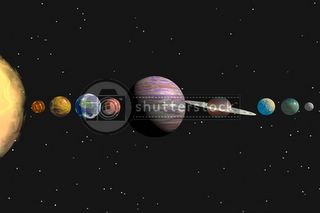** How many planets?

Friends, our solar system has more than nine planets--or less. Actually, scientists can't agree. Late last week, astronomers announced that they have discovered what may be a tenth planet. As big as Pluto, and three times more distant, the frigid object is called 2003 UB313 (pending a more catchy name).
But is this lonely world really another planet? The experts are torn. Some say that, as big as it is, it must be a planet. Others say no way--there are only eight of those. That's right, eight--because, according to these astronomers, Pluto is no planet, either. So What Is a Planet, Anyway? That's a job better left to the International Astronomical Union (IAU), the serious scientists who give names like 2003 UB313 to things on the edge of the solar system.
The problem is, the IAU doesn't have an official answer to the question "What is a planet?" Instead, astronomers seem to be left to sort it out for themselves. One says, "A planet is like porn: I know it when I see it." Another laments, "It's something of an embarrassment. . . . We live on a planet; it would be nice to know what that was."
Pretty much everyone seems to agree on this much:
- There are four inner or "terrestrial" planets in our solar system: Mercury, Venus, Earth, and Mars. These are relatively small, they're made mostly of rock and have solid surfaces, and they don't have rings.
- There are four outer or "Jovian" planets in our solar system: Jupiter, Saturn, Uranus, and Neptune. These are relatively large, they're made mostly of gas, and they have rings.
Wait, You Missed Pluto!
Well, Pluto is where the disagreement starts. It's either a unique, small, and distant planet or, as many astronomers now think, a large Kuiper belt object (KBO). The Kuiper belt is an icy ring of asteroids orbiting on the far side of Neptune. Astronomers have spotted more than 800 KBOs so far, including a few biggies--nearly as big as, or even bigger than, tiny Pluto (which is smaller than our moon).
These big KBOs cast big doubt on whether Pluto really is a planet. It all depends on the scientific definition of "planet," which doesn't yet exist. Now, 2003 UB313 is forcing the issue--forcing most astronomers to admit that if Pluto's a planet, 2003 UB313 and its ilk probably are, too. No one wants to revise all of the world's astronomy textbooks. But to preserve scientific consistency over mere convention, astronomers may soon have to decide that there are only eight planets, or that there are many more than nine.
Steve Sampson
August 2, 2005



0 Comments:
Post a Comment
<< Home